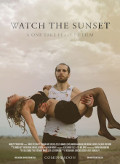
Directed by
Tristan Barr /Michael Gosden
80 minutes
Rated MA
Reviewed by
Bernard Hemingway

Watch The Sunset
Synopsis: Ex drug addict Danny (Tristan Barr) is just out of jail, has cleaned up his act and arrived in the Victorian country town of Kerang in an attempt to re-unite with his ex-partner, Sally (Chelsea Zeller) and their young daughter (Annabelle Williamson). But he’s come with a badly beaten young woman whom he has rescued from a bikie gang headed up by Sally’s brother, Shane (Aaron Walton) who wants revenge.
Although essentially a fiction film, Watch the Sunset opens with a disturbing selection of real-life news items illustrating the terrible results of heroin and ice addiction. If that scene-setting sequence doesn’t sound like your kind of thing you should probably stop right there as the creative team behind the film certainly deliver on their promise. With its unvarnished documentary approach and up-close camerawork you are about to be taken on an intensely stressful ride with some very unpleasant characters. Belonging to that well-attended school of Australian film-making that has given us illustrious alumni such as The Boys (1998) Boxing Day (2007) and Hail (2012) Watch the Sunset takes us to places that in real life we would never want to be. And I don’t mean Kerang.
But at the same time as the content is disturbing one can’t help but acknowledge the film's accomplishments. Photographed in a single fluid eighty minute take by DOP Damien Lipp who co-produced with directors and co-writers Michael Godsen and lead actor Barr, the latter who was also the film’s editor (presumably a relatively light duty but impressive nevertheless) it was clearly meticulously planned. Although the single take approach has its downside, the camera providing the sole point of view and feeling at times like a frustratingly unseen character, on the other hand it keeps us bolted to the action despite ourselves. If there is however one element that compels in this respect it is Richards Labrooy’s original score that runs continually through the film providing an eloquent complement to the visuals, even at times becoming the only audible sound (although there is no credit for sound design there should have been one).
If the film has an Achilles heel it is on the level of dramaturgy. Although the performances are solid, with both Zeller and Barr creating credible characters, given the essentially realist approach one doesn’t always feel quite convinced that this is how real people would behave when, for instance, your child goes missing (Zeller, who also gets script credit) or your father is about to be shot in the head (Williamson). This is probably partly a function of the script, partly a function of Barr and Gosden’s directorial inexperience but some more time spent on this would have helped to liberate the film from its tendency to fall back onto generic Hollywoodish elements.
But heck Watch the Sunset is a hellishly impressive film particularly as an indie debut - technically accomplished and commendably ambitious. Just don’t expect to be uplifted.

Want more about this film?


Want something different?




